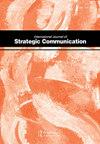战略沟通中的价值隐喻——以希腊经济危机为例
IF 1.9
Q1 COMMUNICATION
International Journal of Strategic Communication
Pub Date : 2022-01-01
DOI:10.1080/1553118X.2021.2001472
引用次数: 0
摘要
摘要本研究在希腊总理的十次演讲中考察了政治隐喻在希腊经济危机背景下的效价。其中五次演讲是在危机第一年向希腊人民发表的宣言,而其他五次演讲则是向国会议员发表的演讲。从隐喻频率、隐喻效价和隐喻类型三个方面对这两种类型的言语进行了比较。结果显示,在向希腊人民发表的公告中,首相使用的隐喻明显多于向议员发表的演讲。在效价方面,分析表明,首相在对希腊人民讲话时使用的积极隐喻明显多于消极隐喻;然而,在对议员们的讲话中,这一点并没有得到证实。就隐喻类型而言,总体而言,在向希腊人民发表的演讲中,旅行框架是使用频率最高的,而在向议员发表的讲话中则并非如此。在战略沟通和危机管理方面,积极的隐喻语言是实现该组织(即政府)使命的主要手段,而这正是管理与希腊人民有关的危机。本文章由计算机程序翻译,如有差异,请以英文原文为准。
Valenced Metaphors in Strategic Communication: The Case of the Greek Economic Crisis
ABSTRACT This study examined the valence of political metaphors in the context of the Greek economic crisis in ten speeches delivered by the Greek Prime Minister (PM). Five of the speeches were proclamations addressing the Greek people in the first year of the crisis, while the other five speeches were addresses to the Members of the Parliament (MPs). These two types of speeches were compared in terms of metaphor frequencies, metaphor valence, and types of metaphors. The results revealed that in the proclamations addressed to the Greek people the PM used significantly more metaphors than in the speeches addressing the MPs. In terms of valence, the analysis showed that the PM used significantly more positive metaphors than negative when addressing the Greek people; this, however, was not confirmed in the speeches addressing the MPs. In terms of metaphor type, overall the travel frame was the most frequently used one in the speeches addressing the Greek people, while this was not the case in the addresses to the MPs. In terms of strategic communication and crisis management, positive metaphoric language was the primary means to fulfil the organization’s (i.e., the government’s) mission, which was no other than to manage the crisis in relation to the Greek people.
求助全文
通过发布文献求助,成功后即可免费获取论文全文。
去求助
来源期刊

International Journal of Strategic Communication
Social Sciences-Sociology and Political Science
CiteScore
3.40
自引率
0.00%
发文量
39
期刊介绍:
The International Journal of Strategic Communication examines the philosophical, theoretical, and applied nature of strategic communication, which is “the purposeful use of communication by an organization to fulfill its mission.” IJSC provides a foundation for the study of strategic communication from diverse disciplines, including corporate and managerial communication, organizational communication, public relations, marketing communication, advertising, political and health communication, social marketing, international relations, public diplomacy, and other specialized communication areas. The IJSC is the singular forum for multidisciplinary inquiry of this nature.
 求助内容:
求助内容: 应助结果提醒方式:
应助结果提醒方式:


